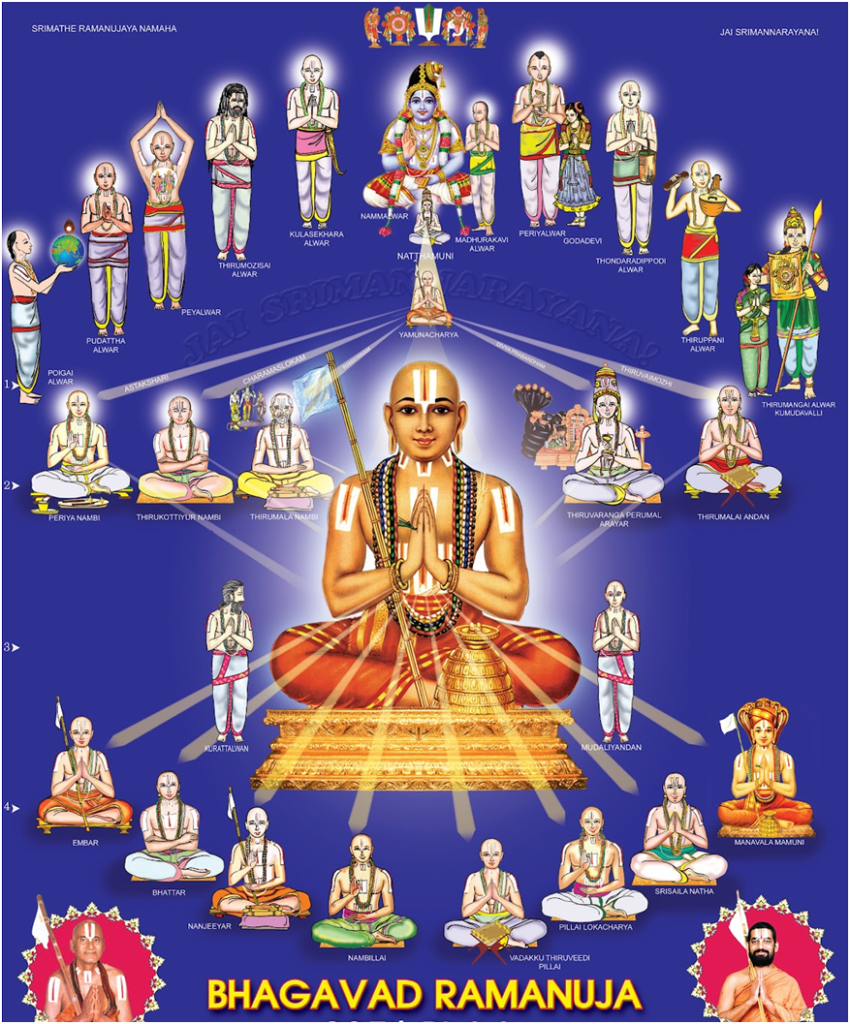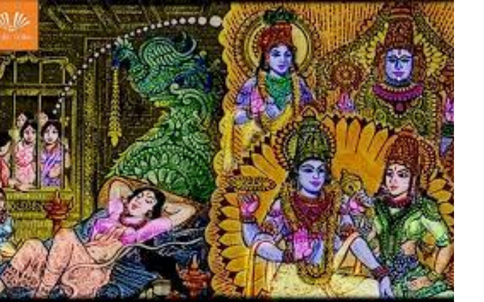Madabhushi Sridhar – Tiruppavai- 9

Tiruppavai by Godadevi from Tamil
ThoomaniMadathuChchutrumVilakkeriya
DhoopamKamazhaThuyilAnai Mel KannValarum
MaamanMagaleManikkadavamThalThiravaay
MameerAvalai-ezhuppeero? Un Magal Than
Oomaiyo! Andri-ch-chevido! Anandalo!
Ema-p-perm Thuyil Mandira-p-pattalo
MamayanMadhavanVaikuntanEndrendru
NaamamPalavumNavindr-el or Empaavaai
English Translation from By Madabhushi Sridhar
In a diamond studded palace & amidst bright lamps
And fragrance of Dhoopa, sleeping on a soft bed,
Oh, Uncle’s daughter un-lock and open the Bells hanging Doors
Oh Aunt, why don’t you wake up your daughter?
Is she dumb, or deaf or sleepy on silky bed?
Or is she in slumber caused by any magic spell?
Mysterious Madhava, Vaikunthesha –Come, let us sing His names thousands of times.

That is a palace decorated with nine kinds of Jewels (Nava Ratna), glowing with bright lamps. Goda connects some relation to them and calls her as the daughter of her uncle (Maradalu -Telugu expression, Maamanmagane =Tamil Expression). She is in deep slumber on a very soft bed amidst the fragrance of SugandhaDhoopa incense sticks. Yet, she is not waking up. Then she requests her mother: Oh Aunt, at least you may wake her up. Unlock the precious stone-studded, bell hanging door so that she joins us to perform Sri Vrata or Sri Nomu or Tiruppavai.
Also read: Krishna, who tore Keshi’s mouth apart & killed Chaanura- Musthika
The precious stone-decked palace referred here indicates that it is complete and devoid of any defect. Nava Ratnas indicate purification. The body called palace will lose its brilliance because of many worldly bonds. If a man progresses and matures, he will get rid of action-based consequences and becomes brighter. Nava Ratnas represent Nava dwara or Nava Randhras of body (nine apertures of the body). If one can drive out impurities, he would shine.
Dependence on Him
One of the nine relationships of Jeeva with Paramatma is based on dependence. The Paramatma is the basis, and jeeva depends on Him. For any living creature the Paramatma becomes a body for the soul. Paramatma has original shining with Nava Ratnas. One can see the devotee in the heart of Paraamatma like a thing visible to outsiders also because of the transparent MarakathaPetika, the jewel box. The Gopikaas are praising that the building of Gopika inside is brilliant than that of the Bhagawan, as it was shining with natural Ratnas. This is because of her constant meditation of the Paramatma.
Also read: Omkar links to God; And chanting of Munis
In addition to the original brilliance, the devotee is lighting the lamps for the sake of welfare of all. That is the reason for arranging lamps during the daylight also. While our hearts called lamps are located outside, your lamps have enlightened inside. Gopika from outside asked her, how it is happening. She answered that she kept her halls lit expecting Sri Krishna anytime for lovely exchanges with her.
The light as life
Here, the light is equated with life. Without the light, the palace (body) is lifeless. The Pramida (bowl of lamp) is the body, the oil in it is the love. If one can lit his life with oil of love, it will throw light on the way to God. The Veda and Commentaries on Veda are like two sticks which should be turned to the side of God in our place of worship. The fire that burns the stick is the Knowledge -Jnana. If Jnana is associated with Love, we can have the Darshan of Lord with utmost clarity. This is how Jeeyar explained Goda’s philosophy embedded in this eighth poem.
Also read: Wake-up calls of Chirping birds before dawn
Nine Kinds of Relations with Paramatma
We have nine kinds of relation with Paramatma:
1. Father-son,
2. Protector,
3. Remainder (Sheshi, one who is a residuary-Jeeva),
4. Bhartha – Husband (One who bears the burden/responsibility like Husband and Jeeva -the wife)
5. Jneya – జ్ఞేయ (He is embodiment of knowledge (Jnathaజ్ఞాత) who imparts Jeeva (Jneyaజ్ఞేయ),
6. Swamy (He is the swamy Ruler, Jeeva is subordinate-Ruled),
7. Dependency (Paramatma is Aadhaara, and Jeeva is the one who depends upon -Aadheya),
8. Aatma (Soul and Body),
9. Bhokthaభోక్త – Bhogyaభోగ్య, one who experiences and enjoys, the Jeeva is vasthu – Bhogya enjoyable thing.
Also read: The bonds of affection, not ropes, bind Krishna
The knowledge of these nine relations are symbols of nine jewels, with which the palace is built, wherein a Gopika dissolved herself in Him which gives us the impression that she is asleep. Prajnaప్రజ్ఞ -wisdom lies in meditating upon God in these nine relations.
That Prajna is the jewel-studded palace. It’s full of lamps, which symbolize brilliance of knowledge. Fragrance of Dhoopaధూప indicates that besides knowledge, they do practice of worship also.
The doors made of precious stones are symbols of ego and self-interests, which can open only with the kind teaching of Teacher (Aacharya). The devotees who always meditate on Krishna, cannot hear or speak anything like the dumb or deaf. Hence, Goda asks the Gopika in that palace, are you dumb or deaf, why are you not listening?

The Nine Jewels-like knowledge
Bhagavad Raamanuja, who is considered as Jagadguru, gave nine jewels-like knowledge in the form of writings.
1. Sri Bhashyam,
2. Vedanta Deepam,
3. Vedanta Saaram,
4. Vedanta Sara Sangraham,
5. NitryaGrandham,
6. Geetha Bhashyam,
7. SharanagathiGadyam,
8. Sri RangaGadyam, and
9. Sri VaikunthaGadyam.
In this song Goda refers to Gopika inside as Mothers’ brother’s daughter (Maama’s daughter- MaamanMakale). Aandaal means mother of all. Sri Raamanuja being king of ascetics – Yathi Raja, considered as elder brother of Goda. Thus, Yathi Raja becomes Uncle. Hence the reference as MaamanMakale. This establishes that in this song, Goda is offering her Vandana to Raamanuja in synchronization with “SrimatheRaamanujayaNamah”.
The Gopikaas ultimately plead with the mother of the girl sleeping inside the palace to wake her up. Mother responded and she sang thousand names of the Lord as Maamayan, Madhavan and Vaikunthanan and being a pious and God loving girl, she woke up on hearing the Lord’s names being chanted.
Also read: Gracefully raining knowledge equally on all





